Transcript: The ForgiveNest Podcast for A Course in Miracles, ACIM | The Active Power of Thought - Why ‘Doing Nothing’ Won’t Get You Out of the Dream, with Alison Anton
”You have dreamed of a separated ego, and you have believed in a world which rests upon it. This is very real to you. You cannot undo this by doing nothing and not changing." [ACIM CE T-4.II.8:4-7]
I'm Alison Anton. You're listening to the ForgiveNest Podcast for A Course in Miracles, your place to explore ACIM topics in healing, meditation, and your special function in forgiveness.
The line I just read is from chapter four in the Complete Edition of A Course in Miracles. Jesus says, "you can't undo this dream by doing nothing and not changing".
As students of the Course, we think there's something so paradoxical that we're in a dream, and yet Jesus himself says over and over how absurd and preposterous this dream is, and yet under no uncertain terms, he also asks us to be very active about how we are in the dream and to be vigilant with our thoughts.
The paradox seems to be that there are two sides of this coin. It sounds like he's saying, "it's a silly dream, but the dream matters". And then we're left to wonder why such a silly dream could even matter.
But the paradox naturally erases itself when we see what he's really saying, which is something more like, "it's a silly dream, but you think it's real, so you made it matter."
I'll talk near the end about another seeming paradox Jesus presents to us about doing and not doing. Again, it looks like a paradox at first glance, but when we look deeper, we see it's clearly not. We'll talk about that in a bit, but let's first start with why we can't just sweep the dream under the rug or dismiss it.
Because it seems so real to us, we can't just do nothing to undo the dream. It requires action to undo it because it required action to do it. This active doing has to do with our thoughts. Thoughts are active or creative in nature. In this dream of separation from God, we can't get away from the power of thought.
Even though what we're making here isn't part of God's creation, or even created in any way like His creation, we're ultimately of Him, and we retain creative ability in our mind because He created our mind as a creator like Himself.
In other words, creation is what we do, and thought is what creation comes from. As creators, we're always using that creation ability in our mind, whether we're awake in the realm of God and using it correctly, or asleep in the realm of the dream, using it incorrectly.
To quote the Course:
"Everything you see is the result of your thoughts. There is no exception to this fact. Thoughts are not big or little, powerful or weak. They are merely true or false. Those which are true create in their own likeness; those which are false "create" in theirs." [ACIM CE W-16.1]
He put that last create in quotes, meaning that if the thought itself is false, what results from it isn't a true creation.
According to the Course, thoughts that are false mis-create. What we see here is a dream, which is a result of a false thought. Miscreation happens when we use a sort of replica of the real creative thought force to make a dream that's not real or related to reality in any way.
And on the flip side, creating in the nature of spirit, or the realm of God, versus the realm of the ego, leads to true and meaningful creation. Meaningful, meaning real, or within reality.
In either case, everything we see is a result of our thoughts. So let's expand on this in two ways. We'll talk about each of these and then bring it back around to why our thoughts and actions are important, even though it's clear this is just a dream.
Number one: there's nothing in between creating and miscreating. We pick one or the other.
And two: our actions in the dream are a direct reflection of what we want to happen as the dreamer.
So number one: there's nothing in between creation and miscreation. As we know so far, the mind either creates reality, what's true, or makes unreality, what's false. From our perspective, which is extremely limited, we would naturally think if one thing is on one side, and the other thing is on the other side, there has to be a spectrum in between. But from Jesus perspective, there is no in between. You can't have: "It's sort of true", or "it's sort of false", or even any gray area in the middle.
There are no levels. What's true is true, and everything else is false. This is why the statement, "I have no neutral thoughts", is so critical to us in the dream. This is lesson 16 in the Course Workbook.
There are no neutral thoughts, or idle thoughts, as he also calls them. All thoughts lead to something. We're creators and our minds are always at work.
Let's continue on with what he says in workbook lesson 16 about this:
"There is no more self-contradictory concept than that of idle thoughts. What gives rise to the perception of a whole world can hardly be called idle. Every thought you have contributes to truth or to illusion. Either it extends the truth or it multiplies illusions." [ACIM CE W-16.2:1-3]
So since the dream is still perpetuating itself, at least from our perspective, I think it's safe to say it's because we're perpetuating it with active incorrect thoughts.
And likewise, if we want out of the dream—active, correct thoughts would be required. And I'm injecting the word “active” in here just to stress that we're doing something with our thoughts. We can't change the dream with neutral thoughts or idle thoughts, because these don't actually exist.
When my best friends and I were young teens, one of the girls' moms would drop us off somewhere like a party or the mall or any place where there was potential for us getting into trouble. For us, that meant pretty much anywhere. But as we got out of the car, she'd look at us all in the eye and say,
"Girls? Remember who you are and what you represent."
As 13 year olds, we'd laugh and roll our eyes, of course.
I didn't realize just how valuable that statement was until many years into my Course practice. Remember who you are and what you represent. It's valuable as Course practitioners because our answer to it is the springboard from which either our true creations or our false makings arise.
This is really our value statement on which all proceeding thoughts and actions are generating. Remember who you are and what you represent. We have to ask ourselves this fundamental question, and of course, answer honestly. It should be asked multiple times a day, and eventually moment to moment as we grow into our practice.
In this moment, who do you think you are? Do you think you're a body? Or are you spirit?
And what are you representing right now? Are you representing the dream, the ego, and the body? Or are you representing what's real? That would be God and ourselves as Spirit.
We are the holy Sons of God. Are we coming even close to representing that in this moment? Or even in our general lifetime?
In every moment in the dream, we actively pick which of these we want to reflect outward. And then we show that or teach that to everyone we meet. This act of reflection literally tells the dream we want to either keep it going, or we want a new perception. Our actions are based on this foundation of: who we are and what we represent… pretty much always.
So we're back to that concept of active participation again, versus either idly biding our time until the dream ends, or even treating people with indifference thinking it doesn't matter. I think Jesus would say both of these are destructive ways of being in the dream because neither are truly idle.
"I have no neutral thoughts." [ACIM CE W-16:1]
Let's sit with that for a few seconds.
"I have no neutral thoughts."
Okay, I mentioned earlier another seeming paradox that Course students can bump into sometimes. We now know that Jesus asks us to be actively doing to help ourselves and others out of the dream. But sometimes it seems as if he's also implying we shouldn't do anything.
On one hand, he says we can't undo the dream without doing something. And on the other, he says we should stop trying to do anything. We think it's a paradox because it looks like his options are in one hand or the other when really both are in the same hand. One of the most popular sections in the text states,
"I need do nothing.” [ACIM CE T-22.VII:1]
Thankfully, that's true. But this section of the Course is addressing what happens when we're trying to use our own volition to propel us out of the dream. We've probably all done this. We recognize we need to do something, but then we use overthinking means, or sometimes even aggressive means to do it.
Examples might be trying too hard to say and do the right things, or meditating overly long hours, or trying to even make ourselves stop thinking. We also might dabble in too many spiritual teachings that aren't intended for our own personal path.
This is okay, and it all works its way out eventually. But sometimes in our efforts to make it go fast, we may be unnecessarily wasting time. Jesus might say in these cases that we haven't asked for his and the Holy Spirit's guidance. Or we don't fully trust it yet. And we're trying to solve the problem with our own egoic approach.
What was Einstein's famous quote? "You can never solve a problem on the level on which it was created". The ego approach is what made the problem in the first place and for sure it can't be what ultimately solves it.
So yeah, in this section Jesus shows us we need do nothing... of our own volition. He says, be still, ask, and listen, and we will hear the answer of what to do, when to do it, and with who.
In these cases, our active doing is sitting in stillness with him and the Holy Spirit during our meditations and reminders throughout the day. And then sharing what is learned from that stillness to the world.
"I need do nothing."
I thought I'd bookend this episode with the passage from the very beginning, along with the sentence that immediately follows it and closes the paragraph it's in:
”You have dreamed of a separate ego. And you have believed in a world which rests upon it. This is very real to you. You cannot undo this by doing nothing and not changing. If you are willing to renounce the role of guardian of your thought system and open it to me, I will correct it very gently and lead you home." [ACIM CE T-4.II.8:4-7]
And I'll leave you with that to ponder.
Thanks for joining me on the ForgiveNest Podcast. I'm Alison Anton.
It was great talking to you.

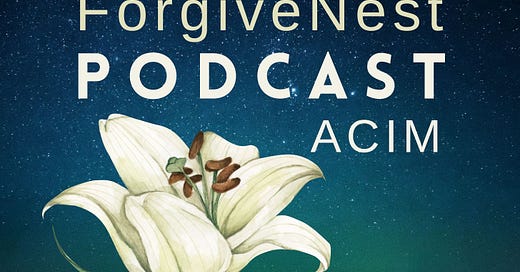




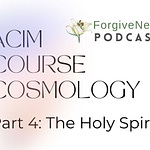
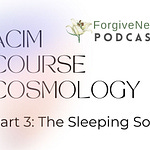
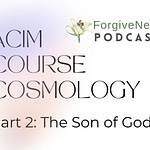
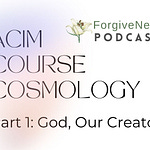
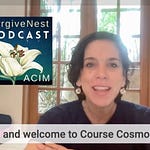
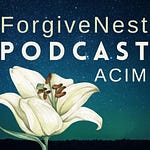
Share this post